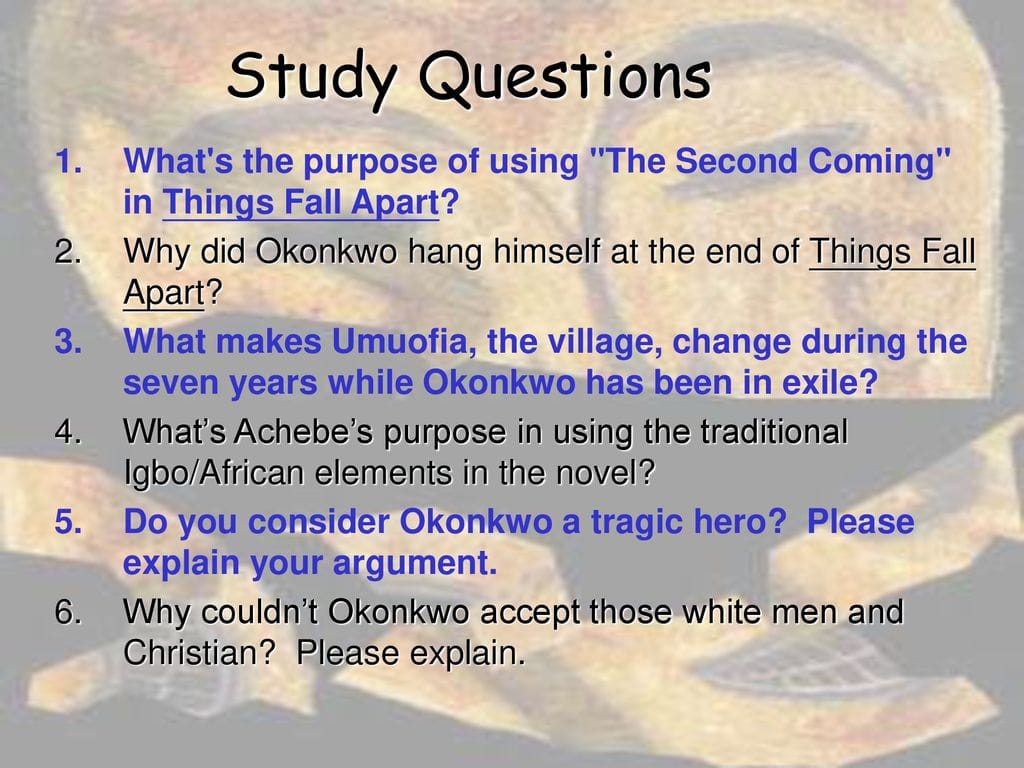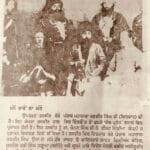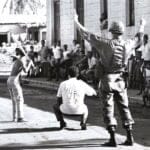Okonkwo, the protagonist of Chinua Achebe’s Things Fall Apart, faces a world undergoing rapid transformation. His story explores the difficult choices individuals face when tradition clashes with change, and the heavy price of clinging to the past. Wondering what DWBI stands for? Follow this link to learn its meaning.
Okonkwo’s Downfall: A Closer Look
Okonkwo’s suicide is not a spontaneous act but the culmination of internal and external pressures. His story is a tragedy, a slow burn to a devastating climax. Let’s examine the forces that led him to this desperate act.
Internal Conflicts: The Shadow of the Past
- Fear of Weakness: Okonkwo is haunted by the memory of his father, Unoka, whom he perceives as weak and effeminate. This fear fuels his relentless pursuit of masculinity, driving him to extremes and preventing him from showing vulnerability.
- Rigid Masculinity: Igbo society’s strict definition of masculinity traps Okonkwo. He struggles to adapt to change, as any flexibility might be perceived as weakness, echoing his father. This rigidity makes him brittle, unable to bend in the face of the changing winds.
The Impact of Colonialism: A World Upended
- Cultural Disruption: The arrival of British missionaries and administrators disrupts the Igbo way of life. The introduction of Christianity and Western law undermines Okonkwo’s authority and creates conflict within Umuofia. This cultural collision leaves him disoriented, struggling to find his place in a world rapidly transforming.
- Erosion of Power: The British gradually erode Okonkwo’s power and influence within the community. He sees the acceptance of Christianity by some villagers as a sign of weakness, further isolating him. This loss of status may have contributed significantly to his despair.
Personal Factors: The Path to Destruction
- Impulsivity and Violence: Okonkwo’s quick temper and tendency towards violence have tragic consequences. His actions lead to exile and further damage his standing within the community.
- Isolation and Despair: As more of his community accommodates colonial influence, Okonkwo feels increasingly alone. His attempts at resistance fail, leaving him with a crushing sense of defeat and despair, likely influencing his final decision.
Decoding Okonkwo’s Death: Symbolism and Significance
Okonkwo’s death is not just an ending; it’s a powerful symbol laden with meaning. It resonates like the final, crashing chord of a tragic opera.
A Culture in Decline
Okonkwo embodies the struggle of a generation grappling with the loss of their traditional way of life. His demise symbolizes the fading of Igbo culture under the weight of colonialism, suggesting the vulnerability of tradition in the face of external pressures.
The Psychological Scars of Colonialism
Okonkwo’s story illustrates the psychological impact of cultural disruption. His internal struggles reflect the trauma of lost identity and the desperate fight to maintain one’s sense of self in a changing world. This personal tragedy mirrors the larger societal disintegration under colonial rule.
Resistance and Desperation
Okonkwo’s suicide can be interpreted as a final act of defiance, a desperate attempt to reclaim agency in a world that has stripped him of his power. Some scholars suggest it’s a way of saying, “You may have taken everything else, but you will not take my spirit.”
A Tragic Irony
Okonkwo’s suicide is a profound irony. By taking his own life, he violates a sacred Igbo taboo, further separating himself from the very traditions he fought to protect. This act underscores his ultimate defeat by the very forces he resisted, highlighting the destructive nature of clinging too rigidly to the past. If you’re curious about why hunters pattern their shotguns, check out this informative article.
The Final Chapter: Unpacking Okonkwo’s Suicide in Chapter 25
Chapter 25 marks the tragic climax of Okonkwo’s story. His suicide is not a sudden impulse but a culmination of factors pushing him to the brink.
The Weight of Tradition
Okonkwo is deeply rooted in Igbo traditions of masculinity, honor, and strength. The arrival of British colonialism directly assaults these values, dismantling the very foundation of his identity.
The Loss of Control
Okonkwo struggles to navigate a world where his traditional values hold little sway. The British imposition of new laws and justice systems leaves him feeling alienated and powerless. He loses his place in a world he once understood.
A Final Act of Rebellion
Okonkwo’s killing of the messenger is a desperate attempt to reclaim control and incite his clan to resist. However, their refusal to join him highlights his isolation and fuels his despair.
The Fear of Shame
The prospect of public shame and humiliation under British law weighs heavily on Okonkwo. In Igbo culture, honor is paramount. He chooses suicide to avoid this fate, believing it preserves his dignity.
The Irony of Okonkwo’s End
Okonkwo’s death is steeped in irony, turning his lifelong pursuits into cruel contradictions.
The Irony of Weakness
Okonkwo dedicates his life to avoiding the perceived weakness of his father. Yet, his suicide mirrors Unoka’s fate, suggesting a hidden vulnerability that undermines his carefully constructed image of strength.
The Irony of Cultural Preservation
Okonkwo’s suicide, a desperate attempt to resist colonial influence, ironically violates a core Igbo taboo. This act, meant to preserve his honor, ultimately brings shame upon his family and clan.
The Irony of Resistance
Okonkwo’s violent resistance culminates in self-destruction, arguably accelerating the decline of the very traditions he sought to protect. His death removes him from the fight, silencing his voice and leaving his clan more vulnerable.
Okonkwo’s story is a complex exploration of the human cost of cultural collision. It raises essential questions about identity, resistance, and the tragic consequences of clinging too tightly to the past in a world demanding change. His fate continues to resonate with readers today, prompting reflection on the ongoing struggles for cultural identity and self-determination.
- Unlock Water’s Symbolism: A Cross-Cultural Exploration - April 20, 2025
- Identify Black and White Snakes: Venomous or Harmless? - April 20, 2025
- Unlocking Potential: Origins High School’s NYC Story - April 20, 2025
















2 thoughts on “The Tragic Fate of Okonkwo: Why He Chose Death in Things Fall Apart”
Comments are closed.